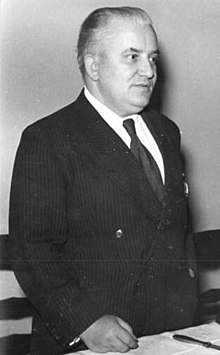Willi Bredel
You can help expand this article with text translated from the corresponding article in German. (October 2022) Click [show] for important translation instructions.
|
Willi Bredel | |
|---|---|
 Willi Bredel in 1951 | |
| President of the Academy of Arts of the German Democratic Republic | |
| In office 1962–1964 | |
| Preceded by | Otto Nagel |
| Succeeded by | Konrad Wolf |
| Personal details | |
| Born | May 2, 1901 Hamburg, German Empire |
| Died | October 27, 1964 (aged 63) East Berlin, East Germany |
| Resting place | Friedrichsfelde Central Cemetery |
| Political party | Socialist Unity Party of Germany (1946–) Communist Party of Germany (1919–1946) Spartakusbund (1917–1919) |
| Awards | Patriotic Order of Merit, in Gold (1961) Banner of Labour (1960) Hans Beimler Medal (1956) Patriotic Order of Merit, in Silver (1955) |
| Signature | |
| Military service | |
| Allegiance | Soviet Union (1941–1945) Spanish Republic (1937–1938) |
| Branch/service | People's Army of the Republic (1937–1938) |
| Unit | |
| Battles/wars | Second World War Spanish Civil War Hamburg Uprising |
Willi Bredel (2 May 1901 – 27 October 1964) was a German writer and president of the East German Academy of Arts, Berlin. Born in Hamburg, he was a pioneer of socialist realist literature.
Life and career
[edit]
Born into the family of a cigar maker, after graduating from primary school he became a metal worker. From 1916 to 1917 he was a member of the Socialist Worker Youth, from 1917 to 1920 of the Spartakusbund and from 1919 of the Communist Party of Germany. In 1923 he took part in the Hamburg Uprising and was sentenced to two years in prison. After his amnesty in 1925, he worked as a lathe operator in the Kampnagel factory while being the editor of various communist news outlets. Due to "Preparing literary treason and high treason", he was in 1930 sentence to two years imprisonment. He wrote his first novels while in custody.[1]
Soon after the Nazis seized power in 1933, Bredel was imprisoned at Fuhlsbüttel concentration camp. He was released in spring 1934.[2] Fleeing from Nazi Germany, he went to Czechoslovakia and then Moscow, where he lived at the Hotel Lux. He published Die Prüfung (1934), a novel describing the Nazi concentration camp, which was reprinted several times and translated into other languages.[2] He also published accounts of his experiences in the Deutsche Zentral Zeitung,[2] a German-language newspaper published in Moscow.
Bredel took part in the Spanish Civil War as commissar of the Thälmann Battalion[3] as well as the Second World War, in which he fought on the Soviet side.
His propaganda material, along with those of Walter Ulbricht and Erich Weinert was used in an attempt to lure the 6th Army into surrendering at the Battle of Stalingrad.[4]
After the war, he returned to Germany as part of the Sobottka Group,[5] sent to lay the groundwork for the Soviet occupation of Mecklenburg. He later lived in East Germany and died in East Berlin.
Awards and decorations
[edit]- 1955 Patriotic Order of Merit in silver
- 1956 Hans Beimler Medal
- 1960 Banner of Labor
- 1961 Patriotic Order of Merit in gold
- 1964 Burial at the Memorial of the Socialists (Friedrichsfelde Central Cemetery)
Selected works
[edit]- Die Prüfung
- The Death of General Moreau and other stories
- Verwandte und Bekannte Trilogy
See also
[edit]References
[edit]- ^ "История немецкой литературы. Вилли Бредель (Willi Bredel, 1901—1964)". 19v-euro-lit.niv.ru. Retrieved 2021-03-16.
- ^ a b c Klaus Drobisch, Günther Wieland, System der NS-Konzentrationslager: 1933-1939 Akademie Verlag (1993), pp. 243–244. ISBN 3-05-000823-7. Retrieved December 21, 2011 (in German)
- ^ Antifascism and Memory in East Germany - Remembering the International Brigades 1945-1989 Archived 2011-07-26 at the Wayback Machine - McLellan, Josie; Oxford Historical Monographs, Page 31
- ^ Adam, Wilhelm; Ruhle, Otto (2015). With Paulus at Stalingrad. Translated by Tony Le Tissier. Pen and Sword Books. p. 178. ISBN 9781473833869.
- ^ "Namensliste der drei KPD-Einsatzgruppen vom 27. April 1945" German Federal Archives. BArch NY 4036/517. Retrieved November 22, 2011 (in German)
External links
[edit]- Willi Bredel Gesellschaft Official website (in German)
- 1901 births
- 1964 deaths
- Writers from Hamburg
- Communist Party of Germany politicians
- Socialist Unity Party of Germany politicians
- Members of the Provisional Volkskammer
- Cultural Association of the GDR members
- East German writers
- 20th-century German novelists
- German Anti-Francoists
- German male novelists
- Refugees from Nazi Germany in the Soviet Union
- International Brigades personnel
- German people of the Spanish Civil War
- German people of World War II
- Nazi concentration camp survivors
- National Committee for a Free Germany members
- Recipients of the National Prize of East Germany
- Recipients of the Patriotic Order of Merit in gold
- Recipients of the Banner of Labor
- Communist writers
- Socialist realism writers
